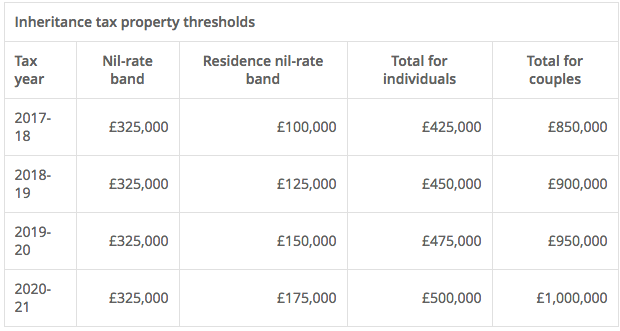
Our Simple Guide On Inheritance Tax
What is it?
Inheritance tax is a taxing of the estate of someone who has just died. Inheritance tax only occurs on any inheritance above the threshold of £325,000.
If the value of your estate is above this threshold, known as the nil rate band (NRB) of £325,000; then the part of your estate that is above this will be liable for tax at the rate of 40%.
You are exempt if…
- The person receiving the inheritance is the spouse of the person deceased.
- Everything is left to a charity.
- If the inheritance includes giving away your home to your children or grandchildren, your threshold will increase to £425,000.
- If the gifted amount was given to the family member/friend at least seven years before the person was deceased. You can gift up to £3000 per year.
- Trust funds – if structured carefully, a Trust could help to reduce or possibly even eliminate your Inheritance Tax liability.
What happens if I give away my property?
If you want to pass on your home, to your spouse when you pass away, there will be no inheritance tax to pay on the property. If you decide to pass your home on to someone else other than your children or grandchildren, then this will be counted towards the value of your estate.
When a property is passed onto a child or grandchild, the tax-free threshold will increase to £425,000. On the moment of the estate going into process following your death, if this sits within 7 years then the property will be treated as a gift if you have already given part or all of your property to a relative.
Inheritance tax on property…
Yes it may seem that being taxed 40% off an inheritance fund, which in theory is money that has previously been fairly taxed, is pretty heavy going but the government recently decided that the threshold will increase for those who’s left over estate includes a property that they have used as a home at some point in their life.
The below table demonstrates how your inheritance tax allowance will increase over the next few years.
Choosing an Executor…
When considering who you should appoint as your executor you should remember the full responsibility you are going to be placing in their hands. The executor is there to carry out your wishes, as stated in the Will. Executors can be beneficiaries under the Will and often people appoint their spouse, civil partner, children or even grandchildren as executors.
It is wise to consider naming more than one executor in case something happens to one before or around the time of your death. Alternatively, another option is a paid professional who usually takes a small percentage (around 3-5%) of the estate, and sometimes an hourly rate on top of this too. Though the added expense isn’t ideal, it may seem the better of two evils, to help to alleviate the stress off of loved ones during an already difficult time.
Estate planning…
Above all, the most important thing you can do is to ensure you have planned your estate concisely so that your loved ones have a clear and stress-free time in administrating your wishes. Be clear in your Will when defining executor responsibilities and think strategically when deciding how to distribute assets (in order to minimize aforementioned inheritance tax).
Should you expect a change in the future?
Probably, as Philip Hammond recently wrote a letter to the Tax Office Simplification to request a review is carried out over many aspects of inheritance tax. The letter is designed to prompt the right kind of review that would achieve a comprehensive check on the nature in which the handing of an estate is able to be managed easily without pain and excessive complications.
Since the threshold of £325,000 per person, has been in place since 2009, the HMRC have absorbed a large sum of inheritance tax. In the last year, HMRC recorded that they collected £4.84 billion in inheritance tax. This is why the review needs to be in place to ensure that when house prices rise, the beneficiaries do not lose out on what has taken a lifetime to create.
Research suggests that around a quarter of individuals aged over 50 are currently unsure about inheritance tax liabilities. Which is even more reason to get the right information now so if you decide to leave something for your loved ones, then you can avoid the hassle and stress that comes along with resolving an estate.
What should I do next?
We would highly recommend speaking to a professional about making the right and well planned decisions as soon as possible. At Stonehouse Accountants, we can help you make the right decisions in creating easy to manage arrangements for your loved ones. Contact us on 01733 265888.

